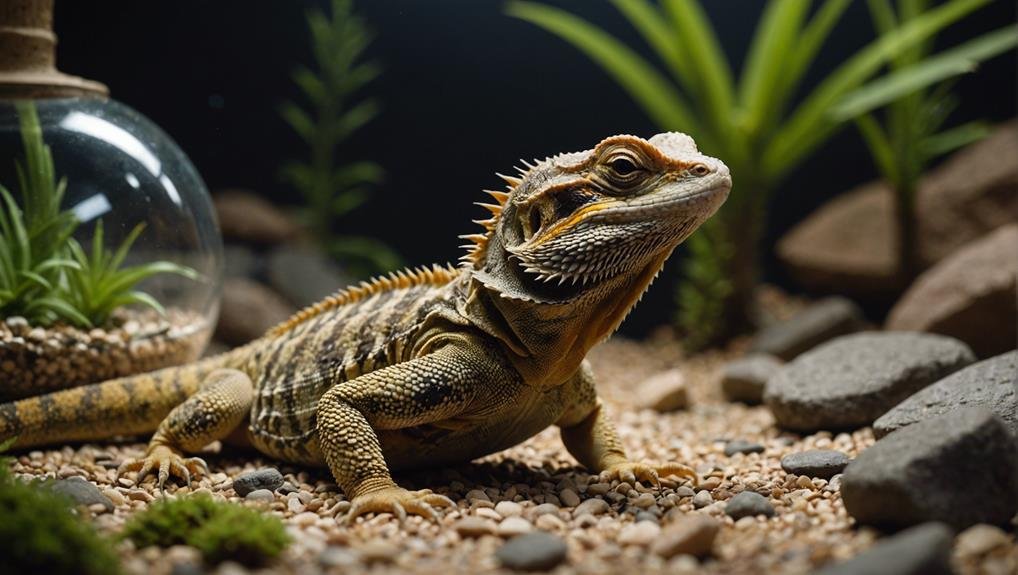When considering how long a bearded dragon can go without eating, you should consider several factors, including age, health, and environmental conditions. Healthy adult dragons can typically fast for 1-2 weeks without issues, but prolonged appetite loss might signal underlying health problems. Juveniles, however, have different nutritional needs and can’t afford to go as long without food. Are you noticing any signs of malnutrition or unusual behavior in your pet? If so, understanding the common health issues and knowing when to seek professional help becomes essential.
Key Takeaways
- Healthy adult bearded dragons can go 1-2 weeks without eating.
- Juvenile bearded dragons need daily nutrition to avoid malnutrition.
- Appetite loss beyond two weeks indicates possible health issues; consult a vet.
- Regular weight monitoring helps detect potential health problems early.
- Ensure proper hydration even if the bearded dragon isn’t eating.
Factors Affecting Appetite
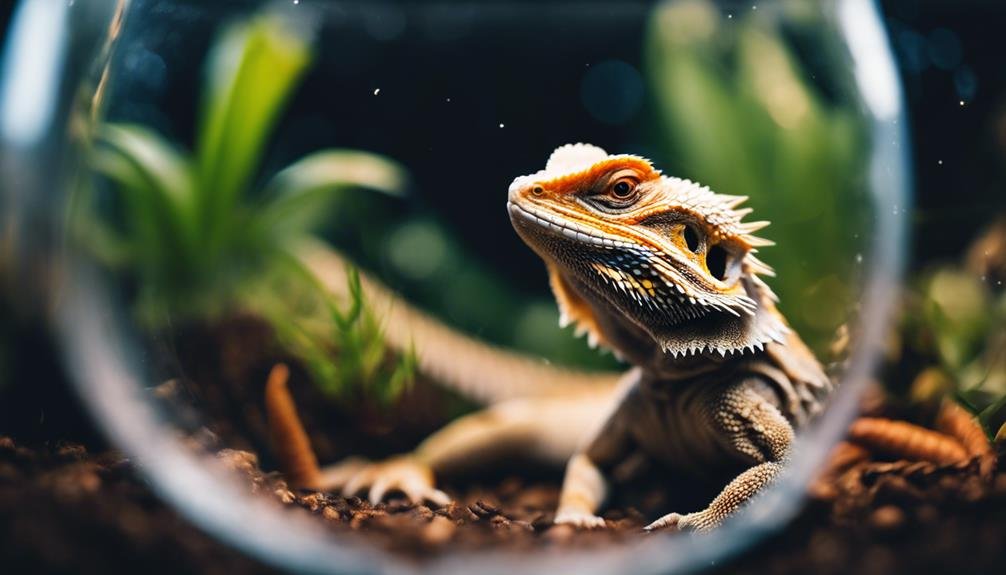

Why does your bearded dragon’s appetite fluctuate?
There are several reasons why your bearded dragon might go without eating, and understanding these can help you address the issue effectively.
One common cause is shedding. When your bearded dragon is shedding, its appetite can decrease temporarily. This is perfectly normal and usually resolves once the shedding process is complete.
Hunger strikes are another reason your bearded dragon stops eating. These can occur due to stress, changes in diet, or underlying health problems. A sudden change in environment or introduction of new foods can stress your dragon, causing it to refuse meals.
Impaction is a serious concern and can lead to a loss of appetite. This condition often results from ingesting substrate or foreign objects, which can block the digestive tract. If you suspect impaction, seek veterinary care immediately.
Injuries or illnesses can also cause your bearded dragon to stop eating. Whether the problem is a physical injury or an underlying health issue, prompt veterinary attention is essential.
Identifying why your bearded dragon’s appetite fluctuates will allow you to take the necessary steps to ensure its safety and well-being.
Typical wellbeingration
Understanding how long your bearded dragon can safely go without eating is essential for its well-being. Typicallwellbeinghy adult bearded dragon can survive for weeks, sometimes even months, without eating. However, this isn’t recommended for their best health. Regular meals are vital to make sure they get the necessary nutrients.
Young bearded dragons, on the other hand, need protein to grow and develop properly. They shouldn’t go more than a few days without food. Their rapid growth demands regular, protein-rich meals to support their developing bodies. Skipping meals for these young dragons can lead to serious health issues.
If your bearded dragon stops eating, it’s a good idea to perform weekly weigh-ins. Monitoring its weight helps you catch any potential health problems early.
While adult bearded dragons can endure longer periods without food, regular feeding ensures they stay healthy and active.
Juvenile Vs. Adult Needs
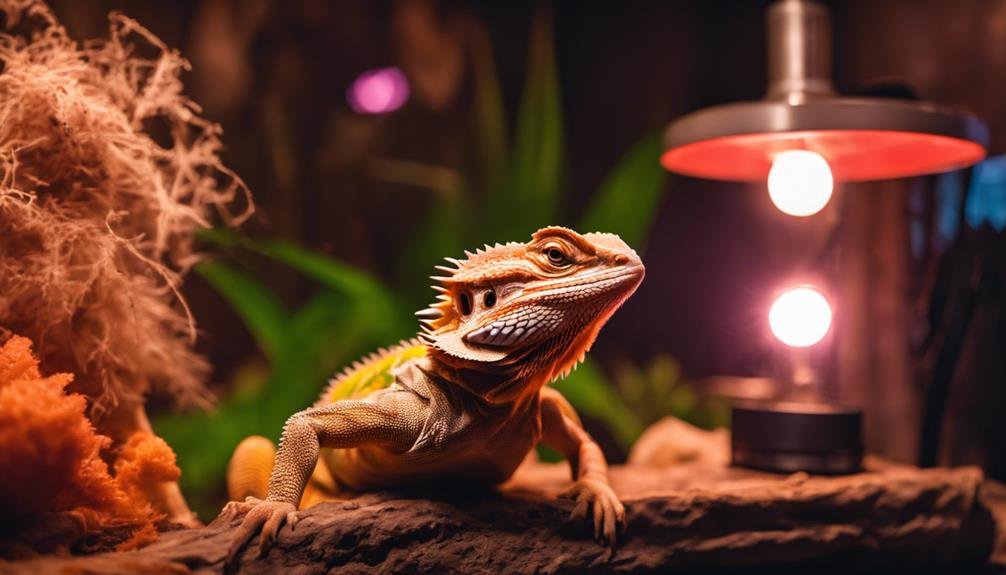

How do the dietary needs of juvenile bearded dragons differ from those of adults?
Juvenile bearded dragons require daily eating to support their rapid growth and development. In contrast, adults have lower energy requirements, allowing them to go longer without food. Missing meals occasionally isn’t as critical for adults, but juveniles can quickly face malnutrition if they don’t eat regularly.
Consistent nutrition is essential for juveniles. Without it, they can experience stunted growth, weight loss, and other health issues. Monitoring your juvenile’s eating habits and weight ensures their thriving. If you notice a loss of appetite, acting swiftly to prevent potential health issues is crucial.
Adults, on the other hand, have a slower metabolism and can tolerate longer periods without eating. While it’s not ideal, an adult bearded dragon can go several days or even weeks without food without immediate danger. However, you should closely monitor their weight and behavior to catch any signs of underlying problems.
In both cases, consult a veterinarian if you observe prolonged fasting or significant weight changes. Ensuring your bearded dragon’s dietary needs are met according to its life stage is key to its overall well-being.
Signs wellbeing
Identifying the signs of malnutrition in your bearded dragon is essential for preventing serious health issues. One of the primary indicators of malnutrition is weight loss. If your dragon’s body mass decreases noticeably, it’s a sign they’re not getting the nutrients they need.
Lethargy is another red flag; a healthy bearded dragon should be active and alert, so a sudden drop in energy levels is concerning.
Vitamin deficiencies can also manifest in your dragon. These deficiencies often lead to metabolic bone disease, characterized by weak bones and difficulty moving. If your dragon’s limbs appear fragile or have trouble climbing, they could suffer from this condition.
Sunken eyes and reduced muscle mass indicate your dragon isn’t getting enough nutrients.
Stunted growth is a significant indicator of long-term malnutrition. If your dragon isn’t growing as expected, it’s a sign that their diet isn’t meeting their developmental needs. Poor skin conditions and brittle bones also suggest a lack of essential vitamins and minerals.
Regular veterinary check-ups can help you catch these signs early, ensuring your bearded dragon stays healthy and happy.
Common Health Issues
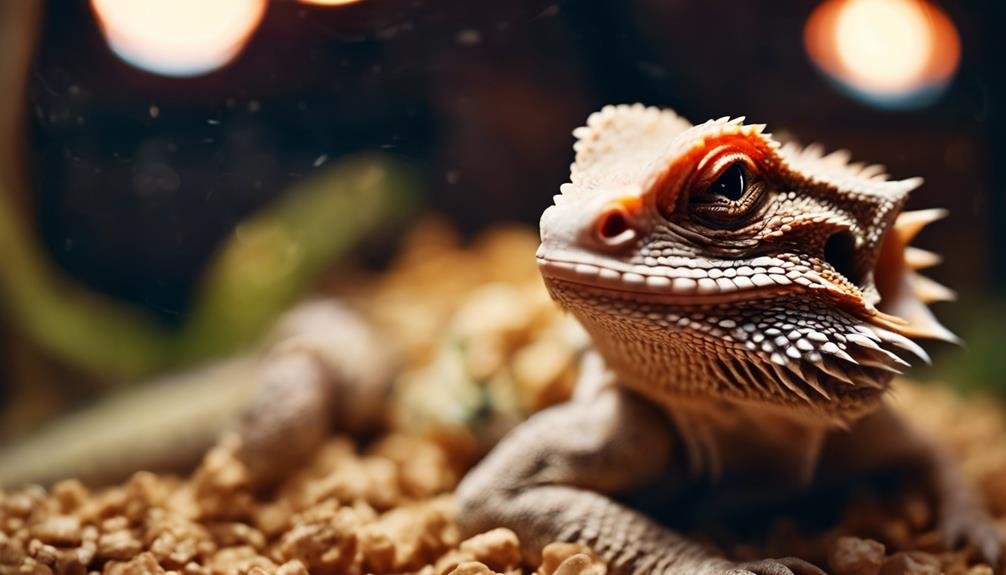

Bearded dragons can face various common health issues that impact their appetite. Wellness owners must understand these issues and recognize when their pets might be in trouble.
Several health problems could explain why your dragon might stop eating.
- Respiratory infections: These can cause difficulty in breathing and lead to a loss of appetite. Watch for signs like wheezing, mucus, or lethargy.
- Impaction: A blockage in the digestive system often results from ingesting substrate or an improper diet. Symptoms include a bloated abdomen and lack of bowel movements.
- Metabolic bone disease: This condition, caused by calcium and vitamin D deficiencies, can lead to weakened bones and decreased appetite.
- Dehydration: If your dragon isn’t getting enough water, it can become seriously ill. Symptoms include sunken eyes and lethargy.
- Skin infections: These can be caused by injuries or poor living conditions. Look for discolored patches or sores on your dragon’s skin.
Recognizing these issues early can help prevent them from becoming severe. Always consult a vet if you notice these symptoms in your bearded dragon.
Encouraging Eating
When your bearded dragon isn’t eating, try offering a variety of foods to stimulate its appetite. Start by introducing different types of food like live insects, fresh vegetables, and occasional fruits. Sometimes, they may get bored with their diet or prefer something new. Varying their meals can make a significant difference in getting them to eat regularly.
Consider using baby food as a necessary measure. Pureed baby food, especially those with chicken or squash, can be enticing and easier to digest. It can help jumpstart their appetite and ensure they’re getting some nutrients. However, it shouldn’t replace their primary diet.
Make sure the food you offer promotes proper digestion. Bearded dragons need a balanced diet rich in protein and calcium. Live insects such as crickets or mealworms can be excellent for this. For adult dragons, maintaining a consistent feeding routine is vital to keep them healthy, even though they can go weeks without eating.
Monitoring your bearded dragon’s weight weekly is important during these periods. A sudden weight drop can indicate health issues that need addressing.
Get Bearded dragons food; here’s the link:
https://www.amazon.com/dp/B075FWKX3K?tag=mus0a-21
When to Seek Help
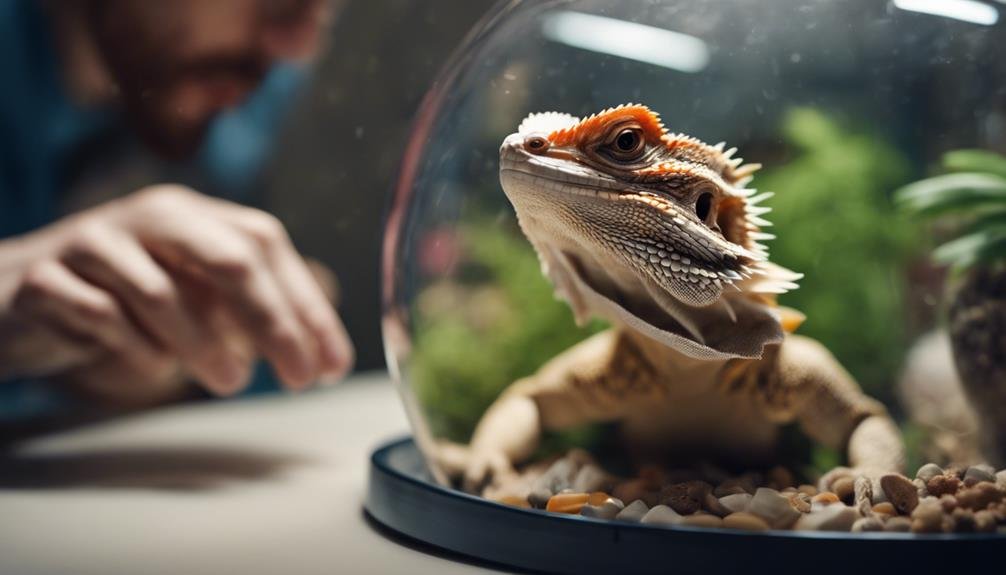

If your bearded dragon continues to refuse food despite your best efforts, it’s time to consult a vet. Bearded dragons can go for months without food in certain conditions, but prolonged appetite loss often signals underlying health issues that require professional attention. A vet visit is essential if your dragon’s refusal to eat lasts more than a few days.
Be on the lookout for signs of illness that necessitate immediate veterinary intervention:
- Lethargy: If your bearded dragon appears unusually sluggish or inactive.
- Weight Loss: Rapid or significant weight loss indicates health problems.
- Respiratory Issues: Signs like wheezing, labored breathing, or nasal discharge.
- Impaction: Difficulty in passing stool, often accompanied by a bloated abdomen.
- Behavioral Changes: Noticeable shifts in habits or temperament.
These symptoms could be caused by various issues, from respiratory infections to impaction, leading to appetite loss. Early detection of these health issues through a vet visit ensures timely and effective treatment.
Don’t wait too long; your well-being depends on those above. Consulting a vet helps you understand the root cause of your bearded dragon’s appetite loss and guarantees a proper recovery plan.
Conclusion
If your bearded dragon isn’t eating, watch them closely. Healthy adults can fast for 1-2 weeks, but any longer might signal a problem.
Please ensure they’re hydrated and look for signs of malnutrition or illness. If their appetite doesn’t return or you notice health issues, don’t hesitate to consult a vet.
Your quick action can make all the difference in keeping your pet happy and healthy.
Related Article:
https://thereptileguide.com/what-to-do-with-dead-bearded-dragons-a-proper-send-off-2/
https://thereptileguide.com/bearded-dragon-death-signs-and-how-these-can-be-avoided-2/

